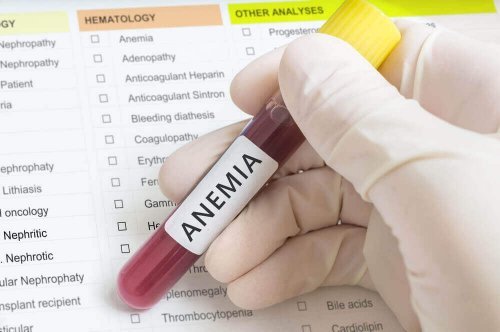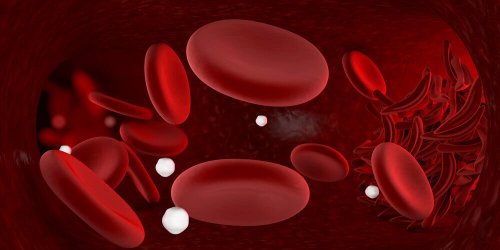Anemia in Children: Causes, Prevention and Treatment

Anemia in children occurs when there is a decrease in the number of red blood cells.
Red blood cells are responsible for transferring oxygen to all the body’s organs through hemoglobin. This, in turn, transports oxygen to the tissues, contributing to their proper functioning.
Anemia is very common in babies between 6 months and 3 years of age, especially if they didn’t receive iron supplements prescribed by a doctor.
The first year of life is crucial for children’s growth. If they don’t receive small doses of iron in this interval, there’s a high risk that anemia will affect them.
Parents should be aware of the symptoms to detect this condition in time. Common signs include pale skin, excessive tiredness, poor appetite, muscle weakness, and drowsiness.

Diagnosis
Your doctor will request a blood test that measures the amount of hemoglobin, iron, hematocrit, ferrite, and others. The results will enable proper evaluation and detection of iron deficiency, as well as the number of iron reserves.
Main causes of anemia in children
- Having vitamin B12 deficiency.
- Difficulty absorbing iron or poor diet.
- Certain gastrointestinal diseases or infections in the body.
- Being exposed to lead emitted by dye, battery, and workshop factories.
- Receiving very long antibiotic treatments. These should be ingested with close attention – carefully complying with schedules and doses.
- Consuming whole milk from cows or other animals during the first year of life. This affects children’s stomachs, making it difficult to absorb minerals.
- Premature children spend less time in the uterus. This prevents them from obtaining the necessary amount of iron reserves.
During the stages of accelerated growth between 1 and 5, and 10 to 13 years, all children have mild anemia. They should especially receive iron supplements in these stages to prevent this ailment, always with a doctor’s guidance.
Consequences of anemia in children
Anemia affects children’s school performance, cognitive development, growth, ability to think, and other aspects. In short, it prevents children’s expected development and progress at any age.
The most important thing to correct is the lack of iron since it compromises children’s intellectual development in the present and future. If you identify this deficiency at an early age and it isn’t treated in time, it can lead to a serious maturational delay.

Preventing anemia in children
Children’s diets must be complete from an early age. A healthy and balanced diet that includes meat, fish, vegetables, fruits, cereals, and milk will provide the nutrition and energy necessary for their growth.
In addition, we recommend the following:
- Encourage breastfeeding, don’t administer commercial milk during the first year.
- Provide iron supplements indicated by a specialist.
- By the end of the sixth month of life, include complementary feeding in the baby’s diet.
- Mothers should be disciplined, with good medical control during pregnancy and then with their baby to ensure his or her health.
- Consider that iron absorption in the baby is more effective when ingesting it with ascorbic acid or citric acid.
The most appropriate treatment
When noticing any symptom that implies the presence of anemia in children, it’s necessary to go to the pediatrician. The doctor will indicate the medication and guidelines to follow according to the severity of the case.
It’s important to always have medical help and avoid trying to solve health-related problems exclusively with home remedies.
The success and duration of the treatment will depend on the child’s progress. Once the diet is followed and the indications are obeyed with supplements or medications, the results will be obtained.
This regimen lasts approximately three months, always observing if the hemoglobin count improves.
Keep in mind that severe cases of anemia may be influenced by other diseases such as asthma or other respiratory problems. In these cases, proper treatment requires blood transfusions.
Anemia in children occurs when there is a decrease in the number of red blood cells.
Red blood cells are responsible for transferring oxygen to all the body’s organs through hemoglobin. This, in turn, transports oxygen to the tissues, contributing to their proper functioning.
Anemia is very common in babies between 6 months and 3 years of age, especially if they didn’t receive iron supplements prescribed by a doctor.
The first year of life is crucial for children’s growth. If they don’t receive small doses of iron in this interval, there’s a high risk that anemia will affect them.
Parents should be aware of the symptoms to detect this condition in time. Common signs include pale skin, excessive tiredness, poor appetite, muscle weakness, and drowsiness.

Diagnosis
Your doctor will request a blood test that measures the amount of hemoglobin, iron, hematocrit, ferrite, and others. The results will enable proper evaluation and detection of iron deficiency, as well as the number of iron reserves.
Main causes of anemia in children
- Having vitamin B12 deficiency.
- Difficulty absorbing iron or poor diet.
- Certain gastrointestinal diseases or infections in the body.
- Being exposed to lead emitted by dye, battery, and workshop factories.
- Receiving very long antibiotic treatments. These should be ingested with close attention – carefully complying with schedules and doses.
- Consuming whole milk from cows or other animals during the first year of life. This affects children’s stomachs, making it difficult to absorb minerals.
- Premature children spend less time in the uterus. This prevents them from obtaining the necessary amount of iron reserves.
During the stages of accelerated growth between 1 and 5, and 10 to 13 years, all children have mild anemia. They should especially receive iron supplements in these stages to prevent this ailment, always with a doctor’s guidance.
Consequences of anemia in children
Anemia affects children’s school performance, cognitive development, growth, ability to think, and other aspects. In short, it prevents children’s expected development and progress at any age.
The most important thing to correct is the lack of iron since it compromises children’s intellectual development in the present and future. If you identify this deficiency at an early age and it isn’t treated in time, it can lead to a serious maturational delay.

Preventing anemia in children
Children’s diets must be complete from an early age. A healthy and balanced diet that includes meat, fish, vegetables, fruits, cereals, and milk will provide the nutrition and energy necessary for their growth.
In addition, we recommend the following:
- Encourage breastfeeding, don’t administer commercial milk during the first year.
- Provide iron supplements indicated by a specialist.
- By the end of the sixth month of life, include complementary feeding in the baby’s diet.
- Mothers should be disciplined, with good medical control during pregnancy and then with their baby to ensure his or her health.
- Consider that iron absorption in the baby is more effective when ingesting it with ascorbic acid or citric acid.
The most appropriate treatment
When noticing any symptom that implies the presence of anemia in children, it’s necessary to go to the pediatrician. The doctor will indicate the medication and guidelines to follow according to the severity of the case.
It’s important to always have medical help and avoid trying to solve health-related problems exclusively with home remedies.
The success and duration of the treatment will depend on the child’s progress. Once the diet is followed and the indications are obeyed with supplements or medications, the results will be obtained.
This regimen lasts approximately three months, always observing if the hemoglobin count improves.
Keep in mind that severe cases of anemia may be influenced by other diseases such as asthma or other respiratory problems. In these cases, proper treatment requires blood transfusions.
All cited sources were thoroughly reviewed by our team to ensure their quality, reliability, currency, and validity. The bibliography of this article was considered reliable and of academic or scientific accuracy.
- Chan CQ., Low LL., Lee KH., Oral vitamin B12 replacement for the treatment of pernicious anemia. Front Med, 2016.
- Allali S., Brousse V., Sacri AS., Chalumeau M., et al., Anemia in children: prevalence, causes, diagnostic work up and long term consequences. Expert Rev Hematol, 2017. 10 (11): 1023-1028.
This text is provided for informational purposes only and does not replace consultation with a professional. If in doubt, consult your specialist.








